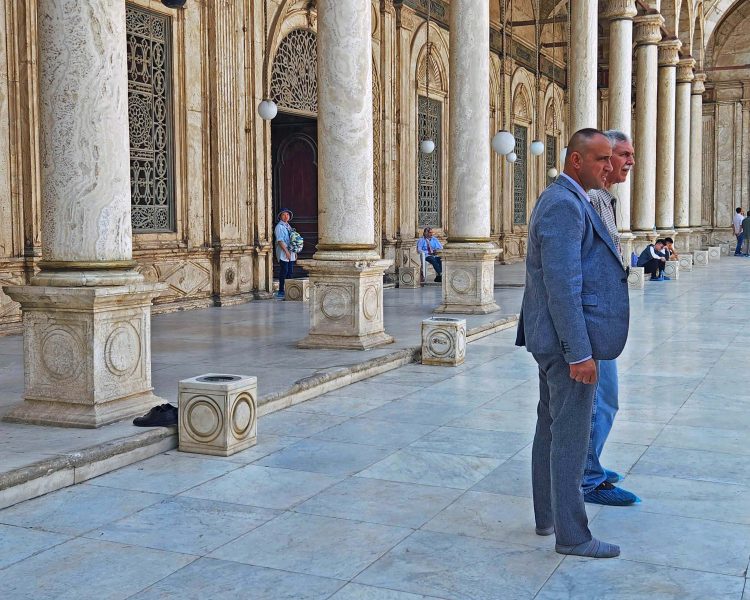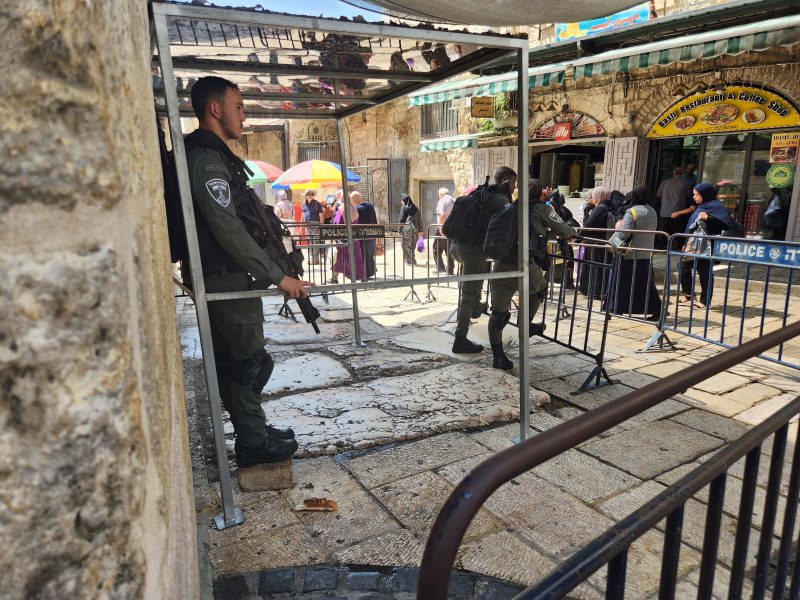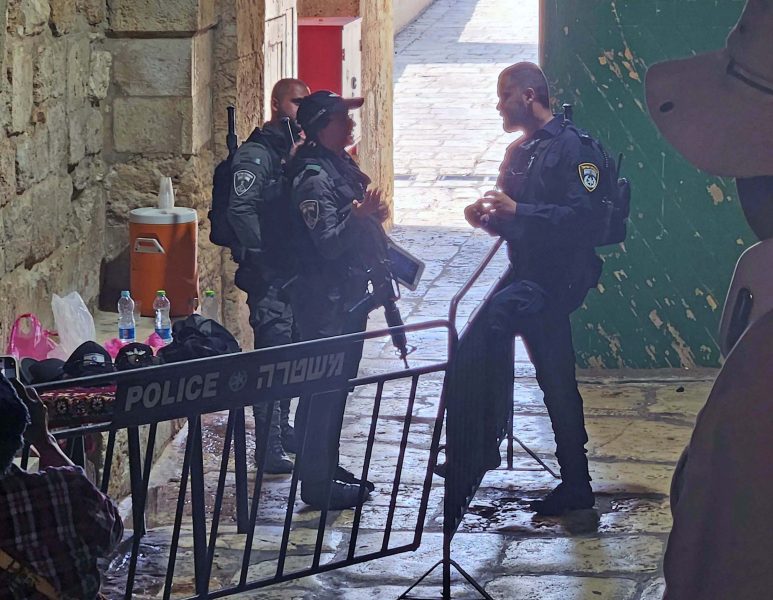Don’t you get tired of airport security? Tired of metal detectors in public buildings? Tired of sending your personal items through a scanner before entering a venue? Ted’s and my 2023 BT showed us real security!
We flew from St. Louis to Newark, then to Tel Aviv. The serious (more than normal USA) security began at the Newark airport. We had already gone through security at STL and had not left the EWR airport concourse, but that wasn’t good enough to go to Israel. Gate areas usually have chairs and windows, and you sit there to wait for your flight to board. You can get up and leave to walk around, use the restroom, buy a snack, or whatever. That’s not so easy if you’re flying to Israel, and it was our first taste of the security we’d be facing in Israel, Palestine, and Egypt on our 2023 BT.
The Tel Aviv gate area was enclosed by movable room partitions. You could look at the tarmac from the concourse windows, but not at the concourse itself. There were two narrow openings in the partitions. We had to enter at the one marked “Entrance” (duh!), show our passports and boarding passes, and go through a detailed screening. We were only carrying backpacks that had been screened by TSA, but they were x-rayed again, wanded, and swabbed for explosives. Then we had to walk through a metal detector and have a wand scan as well. Our flight to Tel Aviv was delayed for about 30 minutes because it needed more cleaning than usual. (A messy crowd before us?) Before boarding, Ted and I wanted to use the restrooms, which required leaving the partitioned area through the second opening. At the exit, a very serious-faced security guard verified that we had our passports and our boarding passes on our persons before allowing us leave the area. When we returned, we had to show our passports and boarding passes again to be re-admitted, and we also had to have another metal detector and wand scan.
A Viking representative met us at the airport in Tel Aviv, walked us through the entry process, and then took us to the bus to go to our hotel in Jerusalem. I’m not sure what the entry process was about because no one seemed to care about the little blue card we had to purchase and were told to carry at all times in the country. Personally, I think it was a way to make money from each visitor—something a lot of popular destinations are doing now.
The next morning, we went on our first excursion in Jerusalem. We were immediately told that none of us should ever sit in the two front seats of the bus. The seat on the right was for a guide and the seat behind the driver was for the armed security guard. This was the pattern for every excursion we took in Israel, Palestine, and Egypt. At every checkpoint (they were everywhere), the security guard got off the bus, talked to the security guards who carried automatic rifles, and waited while the guards used dogs and mirrors to verify that the bus was not carrying explosives. Here’s a picture of one of our bus security guards. You’re required to remove your shoes when you enter a mosque. Frankly, I was surprised the guard removed his shoes. (They’re behind the box-like thing on the left.) What if he had to chase someone or rush to our defense?

The city of Jerusalem is divided into four Quarters: Jewish, Christian, Armenian, and Muslim. No one except Muslims is allowed to enter the Muslim Quarter, and that’s enforced by these guards. Check out the guns.


Even with their automatic rifles, the Egyptian security guards looked a little less frightening because they wore white uniforms due to the heat. They looked more like U.S. Navy officers or medics than security guards–except for their rifles. Still, there were so many checkpoints and so many big guns and so many times we had to show our passports that it was kind of scary. Ted and I literally wore out our RFID passport holders and had to tape them to keep our passports from falling out. Were we really safe traveling in those places? Is this how visitors to the U.S. feel about the gun violence in our country?
At the Luxor, Egypt airport, one guy’s suitcase didn’t make it through the rolling scanner. The guards (with rifles, but thankfully not pointed at him) made him remove every single item from his suitcase right there on the rollers, not on the nearby table. Then he had to re-pack it, picking his things up off the floor while the long line of people behind him (including us) waited for the scanner to re-start to move their luggage. Nothing dangerous was found in the man’s suitcase. Ted was held back for a deep look at his backpack (also in Luxor) and we were both a little nervous, wondering what problem might be found. Nothing, thank goodness.
At the Tel Aviv, Cairo, and Luxor airports, security personnel spoke very little English and English signage was nonexistent or limited, so we always had an English-speaking guide to escort us through the security check. I was thankful for our guide at the Cairo airport as we were leaving for Istanbul. My right knee is bone-on-bone, so if I’m going to be on my feet for a long time (e.g., airports), I wear an elastic knee sleeve to stabilize my knee joint. The security woman (separate lines for men and women in those cultures) did not speak English, so our guide explained to me that the woman wanted me to remove my knee sleeve so that she could examine it. Fortunately, my long pants leg was loose enough to pull it above my knee, allowing me to remove the sleeve without taking off my pants. Without the guide/translator, I’m not sure how long it would have taken me to know what I was supposed to do because the security woman was very adamant and becoming quite loud when I didn’t understand what she was asking. Thoughts of detention were running through my head. Seriously. Sending my purse through a scanner in the U.S. doesn’t seem so bad any more.